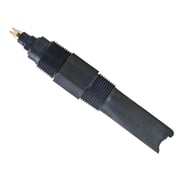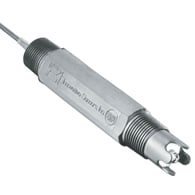What is a pH Probe?
A pH Probe, one of the most common probe types used to measure water quality, determines the level of Alkalinity or Acidity in the water. The typical range of measurement is from 0 to 14 pH. Neutral water would be at around 7 pH, whereas the higher the pH above 7, the more Alkaline and the lower the pH below 7, the more Acidic.
Theoretically, at pH7, the pH probe should output no voltage. As the pH rises above 7, the voltage output starts going negative, whereas if the pH drops below 7, the voltage starts going positive. The further away from neutral (i.e. at pH 7), the more negative (Alkaline) or the more positive (Acidic) the voltage is. The pH controller or instrument, measures this voltage (actually mV) and converts it to a pH reading on the display.
Industrial pH probes, Depending on your application, the ideal pH level will be determined, and the job of the pH probe together with controller/instrument and dosing pump, will maintain this pH level. There are many different types of pH probes on the market, in all different shapes, sizes and types.
There are 2 types of pH probe designs:
What are the types of Probes?
Combination Probes incorporate a reference electrode and a measuring electrode. In simple terms, the reference electrode provides a stable signal, whereas the measuring electrode detects the change in pH.

Differential Probes
These consist of 3 electrodes, i.e. reference, measuring and solution ground. Connected to a pH controller with a differential input amplifier, these types of probes are effective at preventing reference fouling, especially in application with fault currents in the water (i.e. Ground loops). Differential probe application is ideal for tough industrial and/or wastewater applications. It is possible to use a separate Stainless Steel Solution Ground electrode with a standard process pH probe, as long as the controller/interface is suitable.
.png?width=184&name=Untitled%20design%20(5).png)
Laboratory Probes
These are combination probes that are built in smooth 12mm diameter plastic or glass bodies. They are generally used in light industrial applications such as laboratory, environmental or portable monitoring, or swimming pool monitoring applications. Many applications are for intermittent use, even though in light fouling applications they can be used for continuous operation.

Process Probes
These are also combination probes, but typically fabricated in robust plastic housings that have threads front and back, thereby making them suitable for mounting in process lines (via threaded ports in a pipe) and in submerged applications with a suitable probe holder. They are also designed for continuous 24/7 monitoring without frequent calibration requirements.
What does all this mean?
Maintaining the correct pH in your water system will result in better water quality, lower scale conditions, less corrosive environment, reduced downtime, reduction of chemical consumption and more compliance with water quality requirements. The use of the correct type of pH probe is paramount to achieving these objectives. Once you find the right pH probe for your application, ensure you look after the probe with regular cleaning and periodic calibration when required.
For more information, contact us today!
Technical Director at Convergent Water Control, brings nearly 30 years of experience in the electronics industry spanning product design, prototyping, production, and technical support. With deep expertise in industrial automation, instrumentation, and chemical dosing systems, he excels in product management, business planning, and technical operations. Larry’s strong engineering background and leadership ensure the development of compliant, high-quality products and the delivery of exceptional technical support across every stage of a product’s lifecycle.





